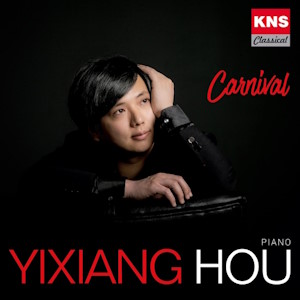
Carnival
Orlando Gibbons (1583-1625)
Pavan in G minor
Charles Valentin Alkan (1813-1888)
Le Festin d’Esope from 12 Études in the minor keys (pub.1857)
Arnold Schönberg (1874-1951)
Three Piano Pieces Op.11 (1909)
Alexander Scriabin (1872-1915)
Sonata No.9 Op.68 Black Mass (1912-1913)
Robert Schumann (1810-1856)
Carneval Op.9 (1834-1835)
Yixiang Hou (piano)
rec. 2022, Werner Hall, USA
KNS Classical KNSA/139 [65]
Yixiang Hou is a Chinese pianist who has achieved success in major competitions since the age of ten; the booklet lists fourteen, several of which he won. While I can’t see a record of his playing in the Scottish International Piano Competition of 2023 his potential recital programmes for each round are listed and the works here all feature there. It is something of an unusual programme with less than obvious variation sets to open, enigmatic and elusive works by Scriabin and Schönberg and the bright, romantic sunniness of Schumann’s Carneval ending the recital. It sort of makes sense if you think of it in those three sections; variations, 20th Century harmonic experiments and Romantic.
The music of Orlando Gibbons is hardly common in piano recitals, indeed it is the keyboard work of his that I have heard so it is nice to hear this melancholy little Pavan, a three section piece that features contrapuntal development over three alternate bass lines. The intricate counterpoint is crafted marvellously by Hou with fine touch and textural nuance; he uses the piano properties without forgetting the kind of instrument it would have been written for. In stark contrast to this miniature stands Alkan’s variations Aesop’s Fables, the final étude from what must be one of the grandest set of études ever composed, the 12 Études in all the Major Keys op.39. Innovative in scope, imagination and technique, the writing is different to anything else being written at the time. Hou, so intimate in the Gibbons, steps up a gear for this vivid and ferocious series of tone pictures; whatever characters one can actually find here is open to interpretation, whether that is the hare in flight (variation seven?), the tortoise and the hare (variations sixteen and seventeen?), the clucking of chickens or baying hounds at the chase. Read them as you will these variations are a delight from start to finish and brilliantly portrayed by Hou.
There is something of the intimacy and fragility of Gibbons’ Pavan in Schönberg’s three piecesof1909 which inhabit a different world again to Alkan’s towering romanticism even while we acknowledge that Alkan was trying new harmonic sounds in his occasional tone clusters and interlocking chord passages. I am taken with Hou’s approach to these pieces, amply demonstrating that for all Schönberg’s experiments in harmony he had not left emotional expression behind. Hou also manages to bring a consistency of touch that further connects Gibbons and Schönberg despite the centuries between them. In Scriabin’s Black Mass sonata he finds the work’s desolation and despair from the opening bars and the complexities of rhythm hold no fears for him. Even in the most strenuous of passages he makes a beautiful sound and perhaps I would sometimes ask for something more wrought; I wanted a wee bit more pain and anguish in the sonata’s later pages, a bit more tearing at the chains that keep it earthbound but that is a minor ask in an otherwise fine performance.
Perhaps the theme of this recital is contrast? Certainly the trajectory of the music is in sudden dramatic changes rather than a gradual progression and yet another is made when the sepulchral mood of the Black Mass is swapped for the heady extravagance of the carnival. Once again Hou finds multi-hued colours and character aplenty in a thoroughly satisfying performance that for all its vigour and excitement is full of lyrical touches; he doesn’t feel it necessary to push the virtuoso elements to their limits though he clearly has the technique in reserve should he need it. Eusebius is a perfect timeless moment and the charm and subtle rubato of Coquette is winning. I think that possibly the only thing I am not sure of is his reprise of Chopin where in trying to find contrast with the first time through he is a little too halting to sound natural but in an otherwise rich and colourful performance this is churlish to point out.
Hou’s sound is captured gloriously in a very natural sounding acoustic and he clearly knows what he wants to get across in his chosen repertoire. If I was dubious about this programme when I first saw it Yixiang Hou, chameleon like in adapting to the wide ranging styles, moods and needs of each piece has persuaded me that it works and it’s certainly different to anything else I have been hearing lately. A pianist to watch.
Rob Challinor
Availability: KNS Classical


















